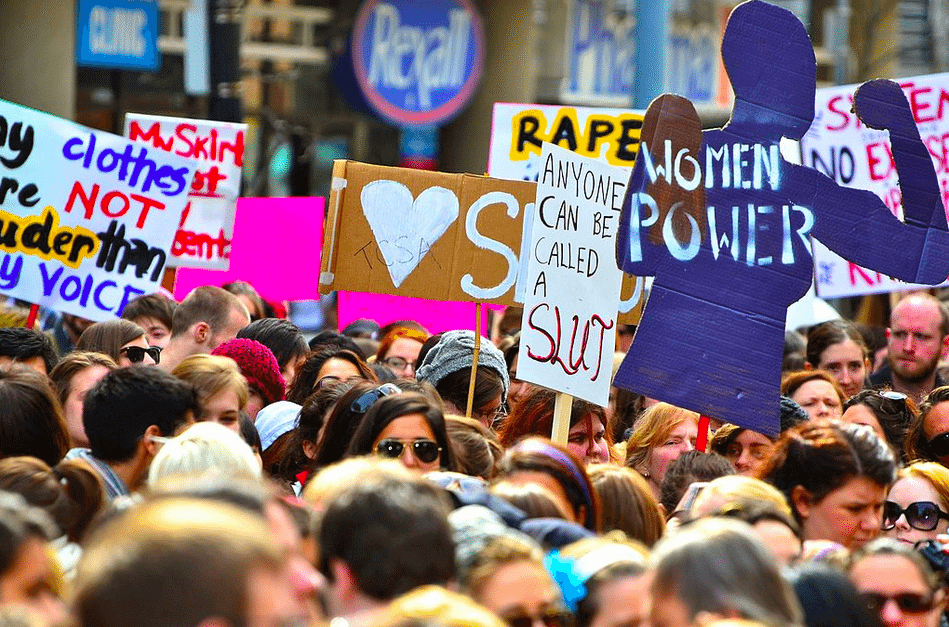Feminism
Confessions of a Recovering Tumblr Feminist
My blissful union with feminism ended in the same way that any long-term relationship does: with hurt feelings, a little embarrassment, and a pang of remorse over what could have been.

When I was in middle-school, I discovered feminism. Always a voracious reader, I devoured every book on it that I could find — eagerly eating the words of feminists like Germaine Greer, Betty Friedan, and Naomi Wolf. When I was done with books, I turned my attention to the interwebs, where communities of social justice warriors congregate.
Little did I know it, as a young teen, I tumbled headfirst into the rabbit hole of the social justice feminist orthodoxy — the perverse wonderland where up is down and everything is actually a manifestation of the patriarchy.
Now, as a student at a women’s college, surrounded by this ideology, I’ve realized the naivety of my early eagerness. For me, feminism was an enticing religion. Raised in a home devoid of faith, I eagerly accepted its philosophy as my ticket to salvation.
As I steeped myself in this type of feminism: the type that emanates from online Tumblr echo chambers and the ideological enclaves of Women’s studies departments, it taught me a number of ideas and values I was eager to apply to my own life.
For example, feminist ideology taught me that any opinions that were conservative, or just didn’t align with the party line were violence. It also taught me that the best way to fight opposition is to try to silence it. Don’t like what someone says? Protest them. Shut their event down.
In retrospect, the fact that I openly embraced an ideology that claimed that holding a conservative viewpoint is the same as life-threatening violence, isn’t just absurd, it’s embarrassing. How was I so deluded?

The advent of conservative speakers being de-platformed or harassed by screaming social justice warriors is a logical consequence of an ideology that equates conservative opinions with physical violence.
This was seen most recently, when Milo Yiannopoulos’s speech at DePaul University came to an end when two social justice warriors ran onto the stage and hijacked the mic in protest of Milo’s views.
Where I lived growing up, people have been shot just minutes away from me, sometimes on my very same street. I’ve woken up to the sound of gun-shots, and two people I went to high-school with have already been killed. Just last week, there were 9 shootings in 24 hours in Cleveland, with more that happened a few days later.
Violence, real violence, is an omnipresent threat in the city where I’m from.
When I went around preaching to my friends that homophobic or sexist language was an act of violence, someone should have called me a fool, slapped me upside the head, and told me to climb back out of the social justice rabbit hole before I made it my grave.
Social justice theory also taught me about microaggressions. Rarely did I go a day without interpreting what someone said as such, as a personal affront to myself or one of the 7 marginalized identities that feminist social-justice Tumblr gifted me.
Social justice theory also taught me that anyone who said anything I didn’t agree with was sexist or homophobic. For example, if someone brought up the fact that some research suggests lesbians and gay men have a disproportionately higher rate of engaging in domestic violence, the feminist rebuttal would essentially be to accuse the other person of being a homophobe instead of engaging in dialogue.
Feminist theory also taught me that the best way to fight oppression was to call people out. Unfortunately, what feminism doesn’t tell you is that running around making accusations of sexism towards everyone you disagree with isn’t productive. Nonetheless, calling people out became sort-of a competitive sport for me.
In retrospect, I wonder if maybe I was a little bit too extreme of a social justice feminist; not all feminists go around calling people racists or sexists, right?
Not all of them. But many do; many of my peers volley accusations of racism and sexism daily. When I look at their politics and the way they advance it now, I think of my younger self. I think about the time I called my friend a racist because she was culturally appropriating Native American for using a dreamcatcher as a room-decoration. Or the time I called one of my friends a “sexist” when he defended catcalling because it’s “a part of inner-city culture.”
Of course, not all feminism preaches the ideas I’ve described. Dissident feminists such as Camille Paglia, Cathy Young and Christina Hoff Sommers carry the torch for a different kind of feminism. One that has its roots in classical liberalism and the promotion of agency, not victimhood. Unfortunately, this is not the type of feminism that appeals to most women.
My blissful union with feminism ended in the same way that any long-term relationship does: with hurt feelings, a little embarrassment, and a pang of remorse over what could have been. I still resist the urge to accuse people who own dream-catchers of cultural appropriation, and calling any man a sexist if he says something I don’t like. But I’m learning, forever haunted by my sojourn down the rabbit hole.






